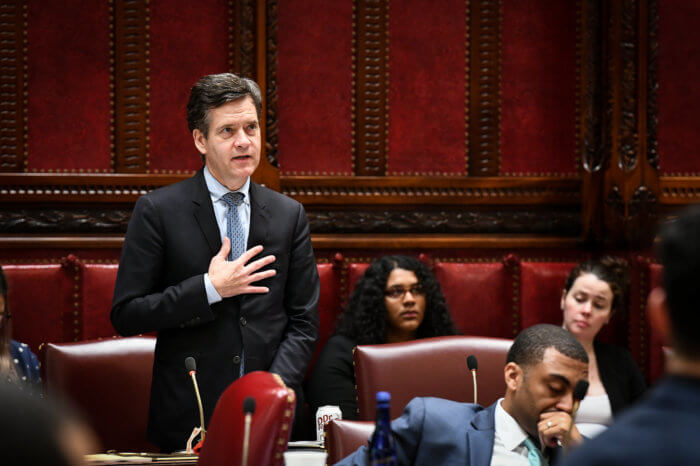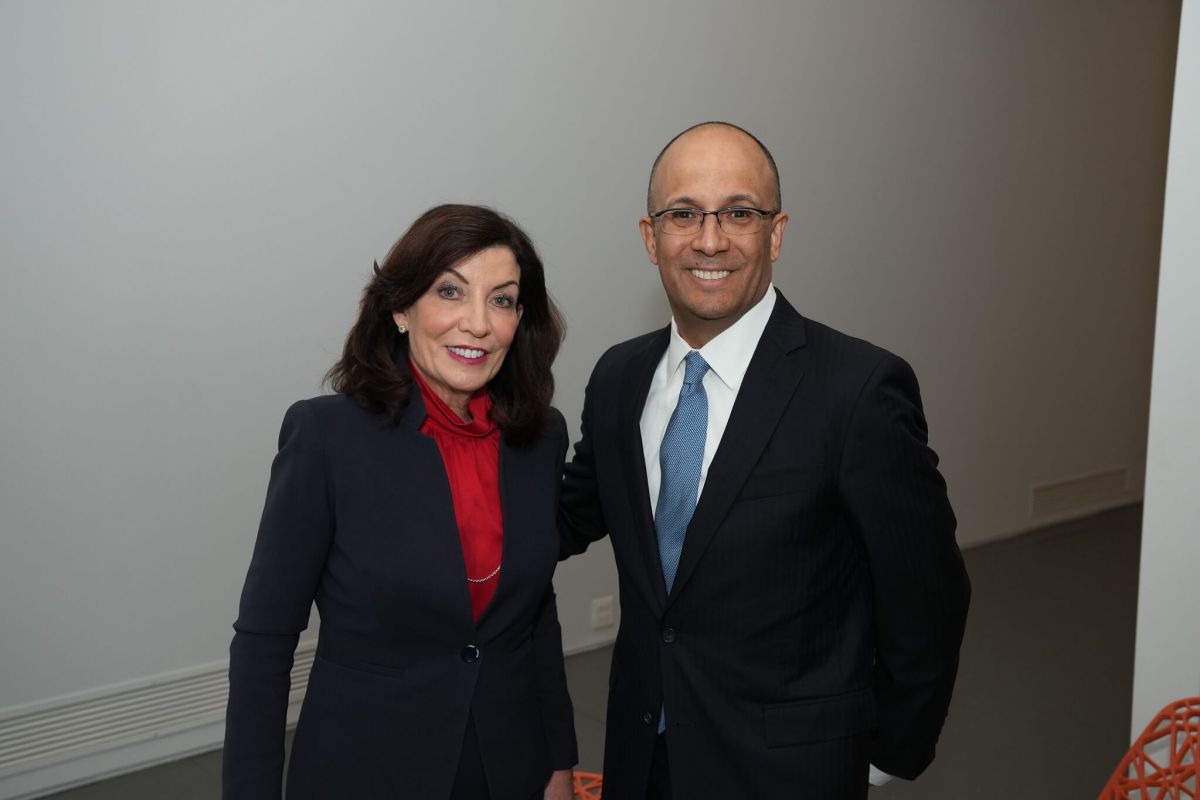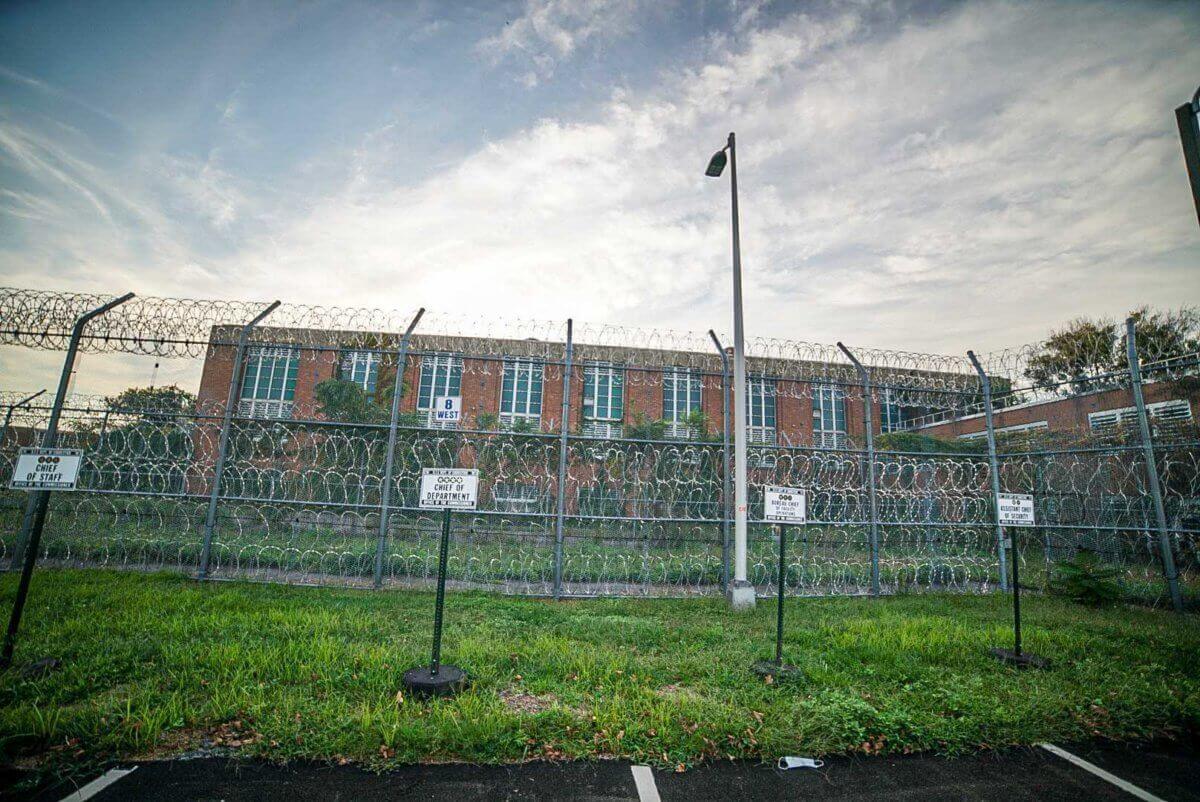Albany lawmakers soundly rejected Governor Kathy Hochul’s nomination for Chief Judge, Hector LaSalle, on Wednesday, giving him the thumbs down after a nearly five-hour grilling at the State Capitol where he sought to defend his contentious judicial record.
Ultimately, just two Senate Democrats — Luis Sepulveda of the Bronx and Kevin Thomas of Long Island — voted to advance LaSalle’s nomination to a full floor vote while ten of their colleagues voted in opposition. Bronx Senator Jamaal Bailey and six of the body’s Republican members voted not to make a recommendation, consigning the nomination to the rubbish bin in a major political defeat for the newly-elected governor.
Hochul blasted the committee following the vote, arguing LaSalle had been shafted by pols already set in their intention to vote him down.
“Judge LaSalle demonstrated exactly why he is the right person for this role – because of his extensive experience, judicial temperament and integrity,” the governor said. “While this was a thorough hearing, it was not a fair one, because the outcome was predetermined. Several Senators stated how they were going to vote before the hearing even began – including those who were recently given seats on the newly expanded Judiciary Committee. While the Committee plays a role, we believe the Constitution requires action by the full Senate.”
LaSalle, the presiding justice of the State Supreme Court’s 2nd Appellate Division and a Long Island native, was nominated by Hochul last month to fill the vacancy left by the retirement of Chief Judge Janet DiFiore, and would have been the first Latino to serve in the role. The Chief Judge is not only the top jurist on the state’s highest court, but is also the administrative head of the state’s entire sprawling court system, including appellate courts, Supreme Court, civil and criminal courts, and specialized venues like surrogate and family court.
But in a break with precedent — which often saw significant deference to gubernatorial judicial nominees — LaSalle encountered substantial backlash to his nomination from lawmakers in Albany’s Democratic supermajority, with members taking exception to rulings signed by the judge on various topics like abortion, criminal defense, and the rights of organized labor.
For weeks, Hochul had strove to counteract the backlash, rallying with other Democrats in the hope of getting the party’s senators to fall in line and ultimately support LaSalle. But the effort proved futile Wednesday, and the governor is now floating filing a lawsuit against the Judiciary Committee seeking to compel a full floor vote for her nominee.
After the committee vote, Governor Hochul did not explicitly state she would file a lawsuit, but did say her team believes the state Constitution requires nominees be voted down by the full Senate, not just the Judiciary Committee.
Article VI, Section 2, Subsection E of the State Constitution reads, in part: “The governor shall appoint, with the advice and consent of the senate, from among those recommended by the judicial nominating commission, a person to fill the office of chief judge or associate judge, as the case may be, whenever a vacancy occurs in the court of appeals.”
Speaking to reporters after the hearing, Senate Majority Leader Andrea Stewart-Cousins sought to dampen the governor’s enthusiasm to continue the brouhaha.
“We had the hearing that we said we would always provide,” she said. “The committee has spoken. As they said, the nomination was lost. And I hope we can move forward and really work to find a Chief Judge that is reflective of the majority of the conference.”
‘A different direction’

The status of the Court of Appeals has become a linchpin of progressive political organizing in recent years as the United States Supreme Court veers increasingly to the right and shows an extraordinary willingness to dispense with precedent. It also comes after years of rightward lurch on the state’s highest court, particularly under DiFiore. Judiciary Committee chair Brad Hoylman-Sigal (D – Manhattan) said in his remarks that “I and many of our colleagues want this court to go in a different direction” moving forward.
That came to the fore this year, when one of the DiFiore court’s last major decisions was to overturn the state’s congressional and state Senate gerrymander, handing redistricting over to a “special master” that came back with boundaries far more favorable to the GOP; Republicans ultimately picked up three seats in a red wave that may have handed the party control of the House.
Before the hearing even started, 14 Senate Democrats had already indicated publicly they would reject the nomination if it came to the floor, including several members of the Judiciary Committee. Nonetheless, Hoylman-Sigal pledged to hold a fair hearing and allow LaSalle his piece, though the chair himself ultimately voted no.
“It is critical that this hearing is fair to the nominee and thorough,” said Hoylman-Sigal in his opening remarks. “Justice [LaSalle], this isn’t going to be a roast, but it won’t be your bar mitzvah, either.”
LaSalle, whose most prominent bloc of support came from the state’s Latino Democratic political class, emphasized the historic nature of his nomination and sought to defend his record from what he characterized as unfair “cherry picking,” seeking to assuage lawmakers worried he would shape the court in the mold of its ruling conservative wing.
“Some have said the job of a judge is an umpire, calling balls and strikes. But Justice Sonia Sotomayor, a role model for me and so many Latinos and Latinas, has astutely observed umpires can call where the strike zone is,” LaSalle noted in his remarks, before affirming he supported a woman’s right to choose and a worker’s right to organize. “This is what I believe. And if that is different from what you’ve heard or read, I am happy now to set the record straight.”
But one by one, Senate Democrats brought up a myriad of concerns, from his overall rulings, to the paucity of actual opinions written by the justice, to running for judicial elections on ideologically disparate party lines.
‘I stand by every decision I’ve signed onto’
Three cases had stood out to opponents of LaSalle’s nomination, who held they were representative of a problematic judicial philosophy.
Those included siding with a controversial “crisis pregnancy center” — a clinic that dissuades women from abortions often using subterfuge — in blocking a subpoena for its business documents; allowing Cablevision to sue union members as individuals seemingly in defiance of decades-old precedent; and perhaps most controversially, ruling for people to be removed from juries on the basis of their skin color, a decision ultimately overturned by the Court of Appeals in People v. Bridgeforth.
In response to those lines of questioning, LaSalle affirmed his support for abortion rights, labor organizing, and the right to a fair defense in a criminal trial; he said the rulings were being mischaracterized, arguing the CPC ruling was a question of “prosecutorial overreach,” the Cablevision case involved union members not acting in their official capacity, and the Bridgeforth case was one where he was constrained by the shackles of precedent.
But ultimately, he declined to disavow his record as a judge. “I stand by every decision I’ve signed onto,” he said. Throughout the hearing, he insisted that his view of the law was that it treats everyone equally, without fear or favor.
Hochul and LaSalle’s supporters had sought to paint the opposition as attempting to “politicize” the court, opining that LaSalle as simply the best man for the job.
“He is a source of great pride to us. Not because he’s Latino only, but because he’s the best candidate for this position,” said Sepulveda, who complained that his fellow Democrats were guilty of “misrepresentation and character assassination.”
LaSalle implied that the backlash to his nomination was at least partly borne of anti-Latino discrimination, noting “too often, the rules change for people like me.”
The committee’s Republicans, too, heaped praise on LaSalle and questioned the motives of committee Democrats. Long Island Senator Anthony Palumbo, the ranking member, deemed LaSalle “the embodiment, in my opinion, of the American dream.”
In a statement after the vote, the Senate Republicans again said the Democrats had politicized the process and urged a full floor vote — even though none of the committee’s Republicans voted in favor, with all of them selecting “no recommendation.”
“The radical majority members of the Judiciary Committee put their far-left politics ahead of their obligation to the people of New York, effectively blocking Justice LaSalle from becoming the first Latino Chief Judge of the Court of Appeals,” said Senate Republican leader Rob Ortt, of Niagara County. “We believe this nomination is due consideration by the full Senate, where it should be considered with an open mind based on his qualifications, not politics.”
But that wasn’t an argument bought by skeptical Democrats, who also dismissed the notion that questioning his record was unfair or targeted at him personally.
“Based on your record, I think that it’s not unfair for people to project what some of your decisions might be. Is that unfair,” asked Queens Democrat John Liu. LaSalle answered that people should look at his “entire record.”
Ultimately, the pro-LaSalle faction could not overcome the concerns, signaling a potentially rocky relationship going forward between the governor and the legislature. The governor’s office did not respond to further inquiries as to whether they would move forward with a lawsuit to force a full floor vote.
Additional reporting by Ethan Stark-Miller






































